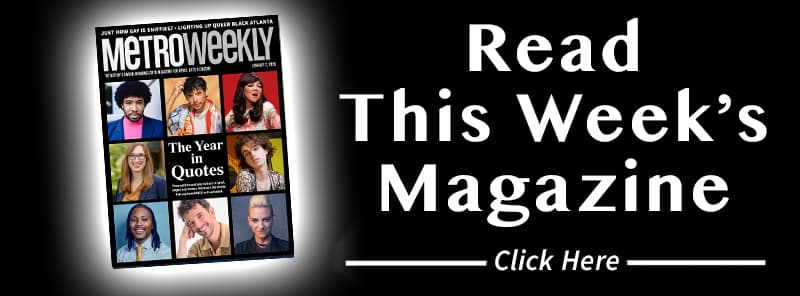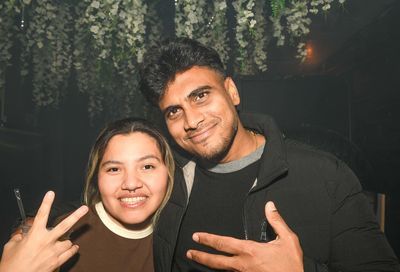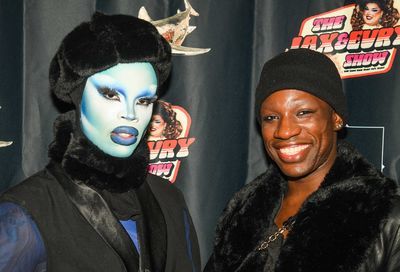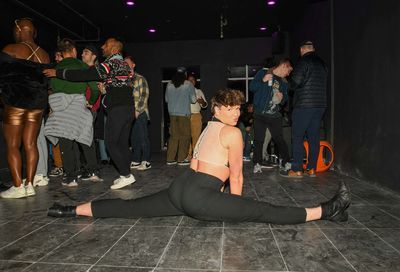Oversexed: An interview with Isabella Rossellini
With Green Porno, Isabella Rossellini is on a mission to help us understand the animals we share the planet with -- through sex, love and maternal instinct.

Isabella Rossellini is perhaps the last person you’d expect to see dressed as a whale, sporting an enormous “six-foot” erection.
But there she is, in an absurdly out-sized blue “whale” suit, seeking a female whale to penetrate. And penetrate she does, in a sequence that is as poetic as it is mildly alarming, one as creatively-wrought as it is incredibly informative.
To be honest, seeing Rossellini dressed as a whale or a creepy spider or a lustrous, luminous squid makes perfect sense in a world whose mating and birthing rituals don’t need to make perfect sense to us. (Did you know the female Cichlid Fish incubates her eggs in her mouth and is fertilized by the male with a direct squirt of semen to the face?)
The actress — notorious for her role in David Lynch’s disturbing masterpiece, Blue Velvet, and well-known as the daughter of Ingrid Bergman, among the greatest screen actresses in Hollywood history, and Roberto Rossellini, the virtuoso Italian director — revels in not only grabbing our attention, but in making us ponder the natural world around us. And her short film series Green Porno, created for Sundance Channel, is nothing if not a work of an adventurous woman with a desire to fold scientific knowledge into an enriching nugget of sometimes bizarre, always compelling entertainment.
Let’s put it this way: Once you’ve watched one Green Porno, which deals with the mating rituals of the animal world, you feel the instant need to instantly watch all 38 of her short films, most about 2 minutes in length.
And Rossellini, who is currently getting her Masters in animal ethology, will bring her live monologue of Green Porno to GWU Lisner on Saturday, November 8 — an adaption concocted with the legendary Jean-Claude Carrière (whose 139 screenwriting credits include The Discreet Charm of the Bourgeoisie and The Unbearable Lightness of Being).
When you talk with Rossellini, the similarities to her mother’s voice are hauntingly apparent — the lilting, soft accent, the warm, comforting, slightly husky voice. And yet, despite her striking visual resemblance to Bergman, Rossellini is very much not her mother. The face of Lancôme cosmetics for 14 years devised her own path, claimed her own fame, and, at 62, is in the process of continuing to forge her own legacy. It would be wrong to dismiss her short film work as cultish or fringe, because it is so abundantly accessible. It merely utilizes creativity in a way that most other filmmakers haven’t the courage to attempt — and it does so without special effects, but often with construction paper cutouts.
“I don’t understand anything about computers in movies,” she says. “I wanted Green Porno to look naïve. I wanted it to look like it’s something you can do in your home.”
Rossellini wants us to think. About conservation, about the preservation of endangered species, about the senseless waste and irrevocable harm produced by mass fisheries, about motherhood and whether or not it is defined by selflessness or practicality, about how homosexuality is a natural act and that perhaps it’s only humankind that has imposed an “unnatural outlook” on it.
Isabella Rossellini wants us to view the world not in a different way, necessarily, but in a way that makes us think about the natural recourse of life itself, and our own roles in respecting all life on the planet we share.

Photo by Gilles Marie Zimmerman
METRO WEEKLY: Tell us about the origins of the Green Porno series.
ISABELLA ROSSELLINI: It came to be because Sundance allocated part of their [resources] to experimental filmmaking. I had done a film about my dad called “My Dad is 100 Years Old,” kind of a surrealistic film. I played the role of many different directors all talking about the social importance of cinema — did cinema influence our society or was it a simple portrait of our society? — which was a discussion that I heard a lot when I was a little girl at home. Sundance Channel bought the film.
When the Internet started, Sundance thought [it] could relaunch the short film format. It was very popular at the beginning of cinema. But it never found a commercial outlet, so the shortest [commercial] film you could make was a half hour of television, which is 22 minutes — you leave eight minutes for advertisement. So the idea of the format’s two minutes was what Sundance demanded. I was among the artists that they called and said “We have allocated the money to create this experimental content.” I came up with the idea of Green Porno. They gave me the money to produce three as a pilot. They liked it and they commissioned five more. And so we came out with eight “Green Pornos” first on the Sundance Channel.
MW: There were three seasons in all.
ROSSELLINI: Right. I did about a total of 38 films. We tried to get away from the name “Porno.” It was very catchy, and we didn’t think much of it at the time — we didn’t do marketing research or anything like that. But then when it became successful, it became an obstacle to finding sponsors because they didn’t want the name “porno.” But it was very difficult when we changed the name. We did a series called Seduce Me. There is a series called Mammas. And people still called it Green Porno, so we can’t get away from the name. [Laughs.]
MW: The ingenuity behind all the films is impressive. You take performance art, puppetry, animation, nearly every conceivable format — even documentary — and blend them together. I’ve been sending the links to everybody I know saying, “Have you seen this? You have to watch this.” It’s visually stunning, yet so deceptively simple.
ROSSELLINI: I worked for many years as a model in advertisements, so images that are striking have been my career for 30 years. The short film format has to be very impactful, very fast. [Feature] films have to also be photographically impactful, but when you do modeling and advertisement, there’s a really constant worry, because you have one shot and you have to communicate in that shot a lot of things. When I write my scripts, I illustrate them. My scripts are all little story boards, I story board them, and I give the basic solution to the costume and then I let [the designers] come up with the [physical] solutions.
MW: No CGI from what I could tell.
ROSSELLINI: I don’t understand anything about computers in movies. I wanted Green Porno to look like it’s something you can make in your home.
MW: I loved the Mammas series, with “Spider” being my favorite. It’s compelling the way it’s enacted — not to mention what we learn about the mother spider’s self-sacrifice.
ROSSELLINI: Isn’t it incredible? The spider that digests herself so her babies can eat her? It’s amazing. On Mammas, I had a woman scientist consult — Marlene Zuk. She’s almost like a feminist scientist. She had looked into everything that had to do with maternal instinct. She questioned it and started to research it — what do we mean by maternal instinct? Everybody has an idea that maternal instinct is so generous and self-sacrificing and that it’s present in all the mothers. Are mothers hard-wired to self-sacrifice? Is that what femininity is all about? And so she studied animals to see if it is indeed true that females sacrifice themselves for their babies.
MW: And that’s not always the case, as we learn from the hamster segment, where she actually eats her newborn, but for very valid reasons, it turns out.
ROSSELLINI: Yes. We look at this and we say, “Oh, this hamster — something went wrong and the mother may be crazy, or she’s in captivity so her behavior is skewed.” But it’s not true. You find that quite common. And so Zuk said “Maybe motherhood is not always about self-sacrificing, maybe mamma is to also be very practical.” I loved her approach.
MW: What’s the concept behind the live evening?
ROSSELLINI: Carole Bouquet, the French actress, quite known in France and Europe, said to me it had to be more than just an experimental film. She thought I should develop it into a monologue. I’ve never done any theater, and I said, “I don’t know how to write a monologue,” but she called Jean-Claude Carrière. He’s a wonderful French writer — he’s going to be the recipient this year of the honorary Academy Award. He loved my films and said that he’d be available to help me. So we worked together for about five months and wrote the monologue. To put all this in an hour and 15 minutes — I wouldn’t have been able to do it if I didn’t have Jean-Claude. We were able to do a monologue that goes much more in depth [than the films]. We could create categories. We could make parallels.
MW: The live show addresses homosexuality in the animal world.
ROSSELLINI: I never want my films to be moralistic, but when it came to homosexuality, Jean-Claude wrote something so beautiful. There is homosexuality in animals.
Every time [researchers] saw animals of the same sex mating, they said, “Oh, something is wrong with these animals.” They were observing them, and maybe this corrupted their behavior and this is against nature. We attribute to the act of mating just the one outcome — pregnancy. But the act of mating is used for things other than reproduction. It’s used to create bonds, it’s used to create families. When we look at our own behavior, we see that we don’t just link up to reproduce. There are a lot of other things that come with it.
So for a long time, researchers looked at [homosexuality in animals] as if it was a skewed behavior, that maybe we noticed this in a zoo because the animal was in captivity, so the animal went crazy or we modified the natural behavior. Then, in the ’60s, thanks to Jane Goodall, they started studies of animals in the wild. And they saw that [homosexuality] existed among animals there, too.
So this is now observed with a new eye, how we look at homosexuality in the animal world. We look at this and say, “Wait a second, this is natural. It is not against nature. This is happening in nature.” If the ultimate goal of life is to perpetrate the species, homosexuality works against it. So how did it evolve? How did evolution allow homosexuality?
And one of the things being investigated is that it’s our way of thinking that created the problem, because we attribute [reproduction] to the sex act, to say it crudely, the penetration. [Many] animals don’t penetrate each other, they make love externally. There are other functions of reproduction, too — and one other function is to create bonds, to create families.
So Jean-Claude and I looked at these studies and we talked to a few scientists, so we integrated in the monologue this new look at homosexuality in animals. And the preliminary thought is that we — our culture — made us look at homosexuality as something that shouldn’t have existed in nature. But now we’re looking at the act of mating as having other things attached to it than just reproduction.
And actually, when you think about human beings, that was always evident, wasn’t it? Because we don’t make love once or twice in our lives to reproduce, but we make love with our husband or with our wife or with our companion many times. We know that it creates bonds, we know that it creates something else that is being analyzed, and there is a continuity between us and animals. So we incorporated this in the monologue. These are difficult things to incorporate into a two-minute film.

Photo courtesy of Sundance Channel
MW: What has doing this series taught you about your own sexuality?
ROSSELLINI: Not much. I’m always interested in science and I see myself as an entertainer, so I try to use scientific information to make entertaining films. I don’t really want to be moralistic. I don’t want to give anybody a lesson on how their behavior should be. I don’t see a parallel between my personal sexual life and the earthworm’s sexual life. I don’t really know how to give stronger orgasms by learning from a fish. [Laughs.]

Photo Courtesy of Sundance Channel
MW: I failed the penis quiz on Sundance’s website badly. I couldn’t identify any of the animal penises correctly.
ROSSELLINI: That penis quiz, I didn’t create it. It’s something that Sundance did and I have to say that I was not really so pleased about it. You know why? Because it’s not scientifically-based. It was really done to amuse and entertain the audience. It does disturb me a little bit when things go outside the science because I think the strength of my films is that they are scientifically correct. Otherwise it’s just an old lady going crazy, you know?
MW: Speaking of penises, the whale segment of Green Porno finds you discussing, in detail — and even sporting — a giant phallus. It’s a startling sight to say the least.
ROSSELLINI: You know, whales do have a 6-foot penis. It was very impressive to see these penises [in real life] in their very, very bright orange color. But proportionally, it is not the longest penis. Proportionally, the longest penis belongs to a very tiny animal called the barnacle. You know what is a barnacle?
MW: Sure.
ROSSELLINI: It’s a crustacean. It’s sitting attached to a rock and it can’t really move that much. So they have evolved this very, very long penis to make love to a female that is attached to another rock. And Jean-Claude is very humorous at it in my monologue. He said that if we human beings could make love from one building to another building, the image of a man lying in his bed and having his penis going out the window, crossing the road looking for another window and another female in another apartment — it’s so comical. [Laughs.]
MW: Do you recall the first time you became aware of anyone gay?
ROSSELLINI: I remember my cousin was gay — was, because unfortunately he died of AIDS. When he was little, I think he felt embarrassed about it or he would say that he felt this attraction, but that he was going to be cured or he hadn’t met the right girl. And when he grew up and was more adult, he started to say that he was gay.
We had friends that were gay. One of my mom’s best friends was gay. It wasn’t really said as openly as it is today — officially it was “single.” It wasn’t as explicit as today where you say when you meet somebody, “Oh, are you gay or are you straight? Can you come with your wife or husband?” You can do this today. It wasn’t like this then, but it wasn’t a taboo in my family.

Photo by Brian Jackson
MW: What do you think of the LGBT social movement of our current time?
ROSSELLINI: It’s extraordinary. But what’s incredible to me is that it is so uneven, that in some countries it is considered a crime and people are killed, that it’s a penalty — and in other countries gay people can marry. This has become one of the biggest divides. We talk always about globalism and the fact that our cultural approaches are similar, but when it comes to gay, actually, it diverges.

Photo by Sundance Channel
MW: What is it like to be not just of legendary parents but to be a Hollywood legend on your own?
ROSSELLINI: I’m not an icon to myself. And my mom was my mom, and she was also known. So sometimes it was difficult in public. We couldn’t ask my mother, “Let’s go have dinner or walk in the street,” because sometimes she couldn’t do it. I don’t have her fame, so I am much freer than her. Maybe because I live in New York, and New York is more indifferent to stars, but my life is more regular.
For us it was our work, it was our profession — we loved our profession, we were grateful to be able to be film makers, actors. The fame was just a side effect. It wasn’t something that we enjoyed, my momma in particular, to be recognized when she walked in the street, not being able to go to a supermarket. It’s not always so nice.
Nobody in my family worked because they would say, “You know what I want in life? I want to be famous. I want people to recognize me when I walk in the street. I want people to admire the way I’m dressed or the way I look.” I don’t think that was the principal goal of anybody in my family. We are storytellers, we are filmmakers, artists, actors, directors. Fame came with it and we accepted it. And fame also allows me to do all the film I want to do.
MW: One of the things you’re most famous for is Blue Velvet, which has achieved its own iconic stature in our culture.
ROSSELLINI: It’s a wonderful film — I love David Lynch’s work. I’m really happy that it became kind of a classic, because at the time when it came out it was very controversial. So it was difficult to be in the midst of the controversy. It’s probably the film that I am most known for. It’s a film that, how you say, typifies my career.
MW: Do you have a favorite film of your mother’s?
ROSSELLINI: It’s difficult to pick one. Notorious is one of them — and then probably Stromboli and Journey to Italy, because both my parents did them and I’m very emotional when I watch those films. It’s easier do it on other peoples’ families — my favorite Hitchcock, my favorite Victor Fleming. But it’s hard to do it in your family. And also artists evolve, so they have periods where they do a similar film and then they change completely, so it’s a complete different adventure. It’s hard to choose when they are too close.
MW: When you look at films today and then at the films from your mother and father’s era, has cinema improved or gotten worse in your view?
ROSSELLINI: It’s hard to tell. They made a lot of films, but with time only the ones that were good or have an impact on our culture remain. And the others have disappeared and are forgotten. When you live in your own modern time, you have so many films, and you don’t know which ones are the ones that stay. My mom made many films but the only ones we see of hers are Casablanca and Notorious. She did other films that disappeared — whether they weren’t good or whatever, they didn’t have the same impact. So it’s hard to compare the past and the present because the present is full of information and the past is filtered, and only a few things remain. So sometimes the past looks better than the present. But the past had been a present, and it was as chaotic as our present.
MW: Finally — and I don’t usually ask a question like this but given your films it seems appropriate — based on the animals you’ve explored in your show, if you had to be an animal, which one would you choose?
ROSSELLINI: I think I would be a dog or a cat — an animal that is a domesticated, a companion animal, because they have it best. I don’t want to be a cow or a chicken in a farm factory — that’s torture — but a dog in an apartment, even, or with somebody who has a back yard, even better. They might have not the freedom to roam, but I think they have a pretty good lives. All the other animals, they are pretty much in trouble right now.
Isabella Rossellini will perform Green Porno, Live on Stage at GW Lisner, 730 21st St. NW, on Saturday, Nov. 8 at 8 p.m. Tickets are $30 to $50. Visit lisner.gwu.edu or call 202-994-6800.
Watch episodes of Green Porno and Mammas at sundance.tv/series/greenporno and sundance.tv/series/mammas.
Support Metro Weekly’s Journalism
These are challenging times for news organizations. And yet it’s crucial we stay active and provide vital resources and information to both our local readers and the world. So won’t you please take a moment and consider supporting Metro Weekly with a membership? For as little as $5 a month, you can help ensure Metro Weekly magazine and MetroWeekly.com remain free, viable resources as we provide the best, most diverse, culturally-resonant LGBTQ coverage in both the D.C. region and around the world. Memberships come with exclusive perks and discounts, your own personal digital delivery of each week’s magazine (and an archive), access to our Member's Lounge when it launches this fall, and exclusive members-only items like Metro Weekly Membership Mugs and Tote Bags! Check out all our membership levels here and please join us today!


























You must be logged in to post a comment.